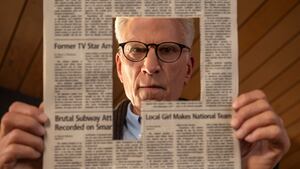The insidious monstrousness of Iran’s regime and culture is brutally censured by The Seed of the Sacred Fig, in theaters Nov. 27, an acclaimed import whose writer/director Mohammad Rasoulof was forced—on the eve of its premiere at this year’s Cannes Film Festival—to flee his homeland due to being sentenced by the Islamic Republic to eight years in prison and a flogging (along with having his property confiscated).
A social verité drama that mutates into a nerve-wracking thriller, the filmmaker’s latest is epic in length, at 168 minutes, and yet intimate in execution, not to mention increasingly propulsive as it barrels towards a catastrophic confrontation. Especially at this precise moment in Middle East history, its pulse-pounding denunciation resounds with seismic impact.
In modern-day Tehran, Iman (Missagh Zareh) is promoted to the position of investigating judge in the Revolutionary Court. This is great news to both him and his wife Najmeh (Soheila Golestani), who’s excited by the prospect of a higher salary and a more luxurious home that affords their teenage daughters Rezvan (Mahsa Rostami) and Sana (Setareh Maleki) their own bedrooms.

Iman has never told his children what he does for a living, but in the wake of this advancement, he confides in them. They’re less than ecstatic about this disclosure, considering that investigating judges—because they rubber-stamp death sentences—are under constant threat of retaliation, and thus they must keep quiet about his profession, refrain from using social media, and carefully vet their relationships.
Iman comes across as a stern and remote paterfamilias, if one who’s a bit shaken by the requirement that he now carry a firearm. He’s also not overjoyed by the fact that he’s being asked to approve death sentences without first reviewing the cases in question. Still, heeding the advice of his colleague Ghaderi (Reza Akhlaghirad), he goes with the flow lest he be seen as untrustworthy and expendable, as was the case with his predecessor.
Further complicating Iman’s transition, Tehran becomes gripped by protests led by female students, whose slogans (“Down with the dictator!”, “Down with theocracy!” “Women. Life. Freedom!”) are a direct rebuke to the country’s misogynistic power structure. Iman is initially sheltered from this commotion, but that’s not the case for his clan thanks to Rezvan’s friendship with Sadaf (Niousha Akhshi), a college student who’s horribly injured in a protest melee.
The Seed of the Sacred Fig precedes this crisis by detailing the dynamics of Iman’s home, which he only visits late at night after long days at the office. Najmeh is a dutiful spouse whose primary concern is protecting her husband’s reputation and career, and she’s tough on her daughters not simply when it comes to staying mum about Iman’s work but with regards to their own propriety.

To her, Sadaf is a potential threat to their Islamic modesty and docility, and despite sitting with the girls as Sadaf decorates Sana’s nails, she’s quick to demand that Sana wash off that paint before her father sees it. As it turns out, her worries are valid, since Rezvan and Sana are a part of the online generation, and when Sadaf is shot in the face with buckshot—which Najmeh removes with tweezers in a harrowing extended close-up—their attitudes permanently shift.
Sadaf’s victimization radicalizes Rezvan, as do the numerous cell phone videos of violent police crackdowns on protestors that put the lie to TV news reports’ pro-regime portrait of the situation. Rasoulof builds tension slowly, allowing it to emerge from his believable action, with Rezvan and Sana’s mounting disgust with their nation’s sexist repression leading to clashes with their parents. Compounding matters to a far more disastrous degree, however, is Iman’s discovery that his pistol is missing from the bedside drawer in which he keeps it. Unease quickly gives way to fear, and then grows into outright panic when Ghaderi confirms that, should his superiors learn of this infraction, they would lose all faith in him and his career would be ruined.
The Seed of the Sacred Fig’s middle section revolves around Iman’s weapon, and the lengths to which the man goes to locate its whereabouts (and deduce who’s taken it) is the driver for Rasoulof’s larger critique. After frantic searches produce nothing, Iman takes Ghaderi’s advice and has his wife and daughters questioned by a fellow interrogator, thereby turning the tricks of his own trade against his loved ones.
Having been raised by a gambling, partying father, Najmeh is grateful for her husband and therefore compliant, at first, with his demands. Nonetheless, Rezvan and Sana are less happy about being treated as one of their dad’s imprisoned enemies, and their distrust of him and what he stands for escalates at the same pace as Iman’s desperation about saving face.
Produced in secret, sparsely accompanied by music, and shot by cinematographer Pooyan Aghababaei with unassuming incisiveness—his compositions subtly conveying the shifting nature of these characters’ relationships—The Seed of the Sacred Fig is a film about the various ways that systems of subjugation are perpetuated. Iman has a vested interest in maintaining Iran’s status quo given that, as a man, he’s the prime beneficiary of its patriarchal injustices, and he’s also compelled to support it because doing otherwise means prison, ruin, or worse.
At the same time, Najmeh is so reliant on her husband for everything that she’s silently coerced by this society into prioritizing him above all else, including her own (and her daughters’) agency and happiness. Without an ounce of preachiness, the director crafts his story as an anguished rebel yell, laying bare the cruelty of Iran’s theocratic government and culture, which ensnares everyone, pitting them against each other (and themselves) and making them all complicit in its continued survival.
The longer Iman’s pistol remains MIA, the more the white-collar executioner grows paranoid, and in its last third, The Seed of the Sacred Fig becomes a harrowing genre-y saga of subterfuge, escape, and revolution. Concluding with real-world mobile video clips of female-led Tehran protests, Rasoulof’s film damns Iran for its fanatical, corrupting, chauvinistic tyranny, all while generating breakneck suspense and, ultimately, resolving its tale with a disaster that contains within it a measure of hopefulness predicated on the ability of women (of all ages and stations) to recognize that they’re not lesser than—and, in fact, are immensely powerful when united in their common cause.









